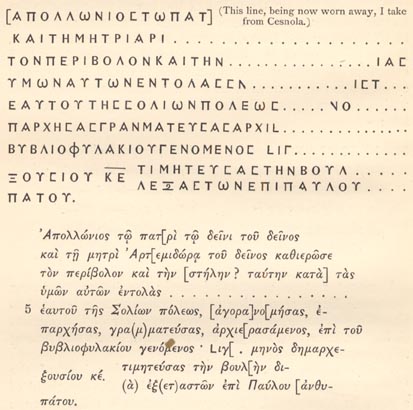
 |
Freethought & Rationalism ArchiveThe archives are read only. |
|
|
#61 |
|
Contributor
Join Date: Mar 2002
Location: nowhere
Posts: 15,747
|
Just noticed, Sergius Paulus the so-called "proconsul" of Cyprus (13:7) was never a consul. Cyprus was obviously a senatorial province, so how could the senate have ever appointed a non-consul as a proconsul? While the fundies are fabricating proconsuls, what do they have to say about this one?
spin |
|
|
|
|
#62 | ||
|
Contributor
Join Date: Feb 2006
Location: the fringe of the caribbean
Posts: 18,988
|
Quote:
The benefactor of the "history" (fiction) in Acts of the Apostles is the 4th century Roman Church And only if Paul REALLY lived was ACTUALLY executed could the author of Acts have mentioned the execution of "Paul". Now, the primary benefactor of the "history" ( really fiction) in Acts of the Apostles is the 4th century Roman Church. Who needed to show that the bishops of the Church of Rome was linked to Peter? But, Peter was a fictitious character. |
||
|
|
|
|
#63 | |
|
Contributor
Join Date: Mar 2006
Location: Falls Creek, Oz.
Posts: 11,192
|
And Peter was frightened,The books of the Gnostic Acts of the Apostles, perhaps authored by an unknown Leucius Charinus, provide a great deal of textual narratives over and above those found in the NT canonical books (eg: the apostolic martyrdoms, Travels and Exploits, daring deeds, etc). These Gnostic books are also fiction (wild and romantic, with ascetic discourses), based on the fiction of the canon and its cast of characters. Quote:
Damasius successfully renovated and ran the Vatican and Catacomb tourist trade in bones and relics. Jerome was his "pupil". The advertisement "PETER WAS HERE" has made certain parties rich for some time. |
|
|
|
|
|
#64 | ||
|
Contributor
Join Date: Jun 2000
Location: Los Angeles area
Posts: 40,549
|
Quote:
The Christians claim Quote:
|
||
|
|
|
|
#65 | ||||
|
Contributor
Join Date: Mar 2002
Location: nowhere
Posts: 15,747
|
Quote:
 List of Roman consuls for example. List of Roman consuls for example.spin Quote:
|
||||
|
|
|
|
#66 |
|
Veteran Member
Join Date: Jul 2001
Location: England
Posts: 5,629
|
http://www.biblicalstudies.org.uk/pd...vanelderen.pdf has more on the inscriptions
|
|
|
|
|
#67 | |
|
Veteran Member
Join Date: Oct 2004
Location: Ottawa, Canada
Posts: 2,579
|
Quote:
Best, Jiri |
|
|
|
|
|
#68 |
|
Contributor
Join Date: Mar 2002
Location: nowhere
Posts: 15,747
|
I've looked for more information about the inscription that is claimed links Sergius Paulus to Cyprus.
From this old book it would seem that the inscription no longer exists, that it was used as a threshold to someone's store in 1880 and was being worn away then. Here's a copy of the text:  and a translation: 'Apollonius to his father … son of … and to his mother Artemidora daughter of … consecrated the enclosure and this monument according to your own (i. e. his parents') commands … having filled the offices of clerk of the market, prefect, town-clerk, high priest, and having been in charge of the record-office. Erected on the 25th of the month Demarchexusius in the year. 13. He also revised the senate by means of assessors in the time of the proconsul Paulus.'Our writer comments on the text: The last two lines and a half after the date are proved, both by their matter and by the use of a different form of xi, to be later additions, inscribed afterwards to complete the list of Apollonius' offices.We should also note that there was a large lacuna on the right of the text, so that "proconsul", ανθυπατος, is actually only ..]πατος (here ..]πατου). I saw one source give the date of the inscription as the 13th year [of Claudius], but beyond the thirteenth year it is merely tendentious conjecture. In an appendix the writer discounts the possibility that the particular Paulus was Paullus Fabius Maximus (consul 11 BCE), though he is arguing against three other scholars of the time who supported Paullus Fabius Maximus. The inscription doesn't help us in any direction. I think the fact that this Sergius Paullus was never a consul should end the matter, but we aren't dealing with evidence here, but willingness to believe. spin |
|
|
|
|
#69 | ||||||
|
Veteran Member
Join Date: Aug 2004
Location: Orlando
Posts: 2,014
|
Hi Spin,
Good catch. According to wikipedia - Paulus is a Roman family name meaning "small" or "humble" in Latin. Quote:
(from behindthenames.com) possibly meaning "servant" in Latin but most likely of unknown Etruscan origin. Quote:
Quote:
Quote:
Quote:
Warmly, Philosopher Jay Quote:
|
||||||
|
|
|
|
#70 | ||
|
Veteran Member
Join Date: Sep 2004
Location: Birmingham UK
Posts: 4,876
|
Quote:
Quote:
Andrew Criddle |
||
|
|
| Thread Tools | Search this Thread |
|